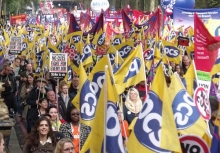Threat to the Equality and Human Rights Commission’s NHRI ‘A’ Status

The United Kingdom's Equality and Human Rights Commission (the Commission) replaced the Equal Opportunities Commission (EOC), the Commission for Racial Equality (CRE) and the Disability Rights Commission (DRC) in 2007 and inherited its legal powers and staff.
The Commission has agreed a 25% cut to its budget over the next four years. This means the annual budget will drop to £17.4m by 2020. In 2007 its budget was £70 million. To put this in context, the combined net expenditure of the CRE, DRC and EOC in 2007 was £50.4m.
The Commission has been subject to a 70% real cut to its budget since 2010, as confirmed by a House of Commons library research paper commissioned by Dawn Butler MP: Equality and Human Rights Commission “facing collapse”.
The United Nations first accredited the Commission as an ‘A’ status National Human Rights Institution (NHRI) in 2009. It became Great Britain’s first accredited NHRI and the UK’s second - joining the Northern Ireland Human Rights Institution which was awarded ‘A’ status in 2006. The UN renewed this accreditation in 2015.
The Commission is part of a global network of more than 105 NHRIs that play an important role at both national and international levels. NHRIs are independent bodies established to stand up for those in need of protection and hold governments to account for their human rights obligations. They also help shape laws, policies and attitudes that create stronger, fairer societies.
Why is NHRI status important?
Being an ‘A’ status NHRI is a powerful tool in our drive to embed a strong human rights culture in Britain. It gives us speaking rights at the UN Human Rights Council and the UN treaty bodies and gives us access to the Council of Europe, European Court of Human Rights and NHRI networks. This opens up important channels for influencing human rights both in Britain and on the international scene.
Threat to NHRI Status
When the United Nations ICC Sub-Committee on Accreditation (SCA) recommended that the Commission be re-accredited with an 'A' Status in November 2015, it made the following observations under the heading: Adequate Funding and Financial Independence:
The SCA notes that the EHRC has experienced a cut in funding, equivalent to approximately seventy percent (70%) of its 2010 budget. The SCA also notes that the number of staff have been reduced from 500 in 2010 to 204 in 2015. The SCA emphasizes that, to function effectively the NHRI must be provided with an appropriate level of funding it order to guarantees its independent and its ability to freely determine its priorities and activities.
We are certain that the current proposals to implement a further cut of 25% will prompt the UN to reconsider the Commission's 'A' Status and trigger a special review. Loss of this status would mean that the Commission would lose its authority when advising UN Treaty Bodies who can make recommendations to the UK Government on human rights issues. It would also damage the UKs international reputation on human rights and put at risk its place on the UN Human Rights Council at the next elections.
Action
Write to the Mr. Vladlen Stefanov, Chief, United Nations National Institutions and Regional Mechanisms to raise concerns about further funding cuts imposed after their 2015 review of the Commission's 'A' Status
Mr. Vladlen Stefanov
Chief, National Institutions and Regional Mechanisms Section
Office of the United Nations High Commissioner for Human Rights (OHCHR)
Tel: +41 22 928 9377
Email: vstefanov@ohchr.org

